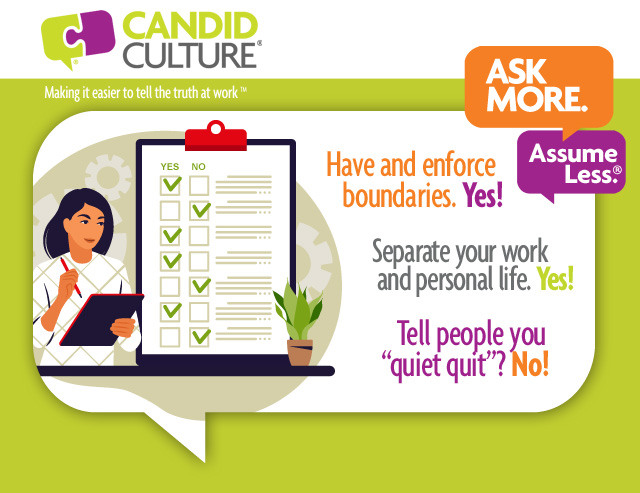Dump the Phrase “Quiet Quit”
The phrase Quiet Quitting is everywhere since appearing in a Tik-Tok video earlier in the year. Essentially quiet quitting is doing your job – just what is asked – not more and not less. Quiet quitters do good work during work hours, not on weekends and not at night. Quiet quitters don’t volunteer to do work outside the scope of their job, that they’re not paid to do.
Is there anything wrong with doing your assigned job and not more? No. Should you do it? If you want to. Should you use the phrase “quiet quit” at work or even with friends? No.

The definition of quiet quit is widely debated. Does it mean doing you minimal best, clocking it in, coasting, slacking, doing things other than work during work hours? It’s confusing and controversial.
The definition of the word quit is to leave, typically permanently. As a business owner who hires and works hard to retain team members, I don’t want my employees thinking of themselves as quiet quitters. It feels like a mentality – one foot out the door. And while the phrase quiet quit may not mean uncommitted, it has that connotation, so why use it?
If anything has become clear in the last almost-three years, it’s that many people want a different life. Many of us discovered that we enjoy being home, don’t want to commute long distances, travel for work, or miss family and social events because our jobs require it. So, let’s talk about that at work.
Employees – find the words to tell your boss what you need rather than labeling yourself with a controversial and confusing descriptor. Managers, find a way to talk with employees about what they need to be satisfied and stay in a job.
Employees and managers are often uncomfortable talking about the things that matter personally. Employees are often afraid to say what they need, for fear of being sidelined or fired. Managers are often afraid to raise the subject of what employees really need for fear of not being able to meet those needs. So, employees quiet quit and managers quietly hope for the best.
How about doing this instead – managers and employees meet individually, virtually, or in-person, every few weeks. Make a work-life check in a regular part of the conversation. Put the topic on the agenda to normalize the discussion and make talking about how work impacts personal an expected part of the conversation. Then start the discussion with something like, “I want us to be able to talk about how work fits in and supports your desired personal life. I want this job to support the vision you have for your life. I may not always be able to give you want, but I certainly can’t if I don’t know what those needs are.”
The world has changed, we have changed, and our needs have changed. We need to be able to talk about those changes without hesitation, worry, and fear. Instead of quiet quitting, schedule a conversation and open the discussion with something like, “I really enjoy my work here. There are a few things I’m realizing I need. Can we talk about it?”
Tags: employee retention, hiring the right people, manage your career, managing employees, managing people, quiet quit, retaining employees, work life balance








100% yes!! thanks for putting my thoughts into words 🙂